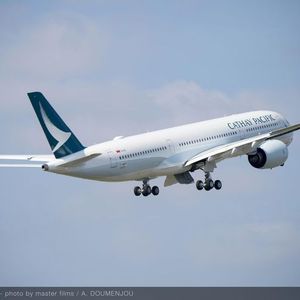Cathay Pacific planes fueled by Amyris in 2-year biojet contract

Photo: Airbus
June 15, 2016
BY Amyris Inc.
Amyris Inc. announced in mid-June that on May 29, Cathay Pacific commenced a two-year program of flights from Toulouse to Hong Kong using Amyris renewable jet fuel. The initial 12-hour flight was the longest flight using a renewable jet fuel to date, further underpinning the drop-in characteristics of Amyris Biojet fuels.
Cathay took delivery of a new Airbus A350-900 that flew from the Airbus facility in Toulouse, France, to Hong Kong using a 10 percent biofuel jet blend provided by Amyris with the commercial and industrial support of Total S.A. The combination of the new airplane's improvements in fuel efficiency (about 25 percent better than current aircraft) and the fuel’s properties resulted in an estimated 30 percent reduction in CO2 emissions according to Cathay when compared to comparable flights in recent-generation aircraft using fossil fuels. All of Cathay’s upcoming A350-900 aircraft deliveries over the next two years will use the Amyris/Total Biojet fuel.
“Amyris and Total have a leading position in the biojet space and we are excited by the potential of this quality fuel to help us achieve the objective of growing our fleet, whilst minimizing our CO2 emissions per passenger,” said Jeff Ovens, head of Cathay Pacific’s biofuel program. “This two-year contract supporting regular, ultra-long haul flights, will provide us with valuable experience as we move closer toward commercial-scale volumes of biojet becoming available over the next few years.”
“We are proud of our accomplishments with Total in support of the future sustainability of air travel and believe we are leading in enabling the use of fossil fuel alternatives,” said John Melo president and CEO of Amyris. “This is an exciting, long-term opportunity to make a real difference in reducing the negative impact on our planet of both a growing population and increasing air travel. We are also encouraged to see airlines such as Cathay taking the lead, by committing to longer-term contracts, investing in this emerging market and collaborating with suppliers such as Amyris.”
Advertisement
Amyris and Total created a sustainable sugarcane-derived, farnesene-based renewable jet fuel through a long-term renewable fuels partnership using a process certified by the Roundtable on Sustainable Biomaterials. These flights represent another step toward projected long-term demand for farnesene for a variety of renewable products. In the area of jet fuels, the two parties have regularly showcased their advanced ability to sustainably fuel commercial jet transportation reliably and efficiently through existing infrastructure by fueling periodic flights for several major airlines. These flights are helping to pave the way for sustainable commercial air travel in the future based on improvements in biofuel economics.
Advertisement
Related Stories
Luxury North Dakota FBO, Overland Aviation—together with leading independent fuel supplier, Avfuel Corp.— on May 19 announced it accepted a 8,000-gallon delivery of sustainable aviation fuel (SAF) on May 12.
Neste and FedEx, the world’s largest express cargo airline, have agreed on the supply of 8,800 metric tons (more than 3 million gallons) of blended Neste MY Sustainable Aviation Fuel to FedEx at Los Angeles International Airport (LAX).
Wheels Up Experience Inc. on May 6 announced the launch of its new SAF program, under which Wheels Up will partner with Delta Air Lines to purchase SAF, allowing private fliers to participate regardless of their flight operator or departure airport.
Germany-based Mabanaft on April 17 announced it started to supply SAF to airlines at Frankfurt Airport in January. The company said it will deliver more than 1,000 metric tons of SAF to the airport this year under the European SAF mandate.
easyJet and ATOBA Energy, in partnership with World Fuel Services, announce the signing of a memorandum of understanding for the development of long-term supply of SAF for easyJet’s operations in Europe and the U.K.
Upcoming Events










